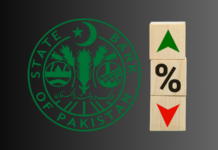KARACHI: The Overseas Investors Chamber of Commerce and Industry (OICCI) has unveiled its recommendations for the Federal Budget 2025-26, presenting a wide-ranging tax reform agenda aimed at broadening the tax base, improving compliance, attracting investment, and enhancing revenue collection by the Federal Board of Revenue (FBR).
The OICCI noted that a more equitable tax contribution from all sectors, in line with their respective GDP shares, could raise Pakistan’s tax-to-GDP ratio to 14 percent from the current level of below 10 percent.
Among the key proposals is a phased reduction of the corporate tax rate to 28 percent in FY2025-26, with a one percent annual cut leading to a 25 percent rate in five years. The Chamber argued that aligning Pakistan’s corporate tax rates with those in peer economies would improve global competitiveness.
To widen the tax net, OICCI called for immediate inclusion of under-taxed sectors, namely agriculture, real estate, and wholesale and retail trade, into the formal taxation system. It also proposed cutting the general sales tax rate on goods to 17 percent now, with further annual reductions to bring it to 15 percent, in line with regional norms. Harmonizing sales tax policies between federal and provincial authorities was identified as key to easing compliance and encouraging business growth.
The Chamber also urged the gradual abolition of the Super Tax over the next three years to promote fiscal predictability and investor confidence.
Highlighting the significant losses from the illicit cigarette trade, which it said costs the government over Rs300 billion annually, the OICCI stressed the need for strong enforcement to curb this leakage. In the energy sector, it recommended taxing all major petroleum products at applicable sales tax rates to ensure fair contribution from the sector.
The OICCI also emphasized the urgency of clearing more than Rs120 billion in outstanding tax refunds, calling consistent and transparent policies essential for restoring investor trust and drawing foreign direct investment (FDI).
The Chamber further proposed increasing the individual income tax exemption threshold to Rs1.2 million per year, while maintaining the mandatory filing requirement for those earning more than Rs600,000 to preserve and grow the taxpayer base.
OICCI President Yousaf Hussain said the reforms are designed to create a transparent, predictable, and equitable tax framework that supports economic expansion and employment. Secretary General M. Abdul Aleem added that with the right reforms and consistent policies, Pakistan can significantly broaden its revenue base and reestablish itself as a viable investment destination.
The OICCI reaffirmed its commitment to working with the government to shape policies that drive sustainable economic growth and prosperity.























